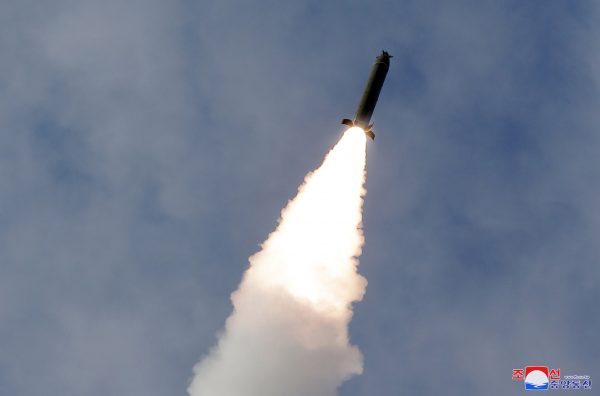 |
A projectile is launched during a long-range artillery drill by the North Korean army's long-range artillery sub-units on March 2, 2020, in this photo released by the North's official Korean Central News Agency the next day. (North's official Korean Central News Agency) |
US President Joe Biden said Tuesday that "nothing much has changed" despite North Korea's launch of short-range missiles, as senior US officials said the firings were not in violation of UN Security Council resolutions.
"We've learned nothing much has changed," Biden told reporters before boarding Air Force One en route to Washington from Columbus, Ohio, where he was making a visit to promote the American Rescue Plan.
He also said the missile launches were not considered a provocation.
"No, according to the defense department, it's business as usual," he said later in Washington, according to White House pool reports. "There's no new wrinkle in what they did."
North Korea fired two cruise missiles off its west coast Sunday, military sources said in Seoul.
Unlike ballistic missiles, cruise missiles are not sanctioned by UN Security Council resolutions. The North has maintained a self-imposed moratorium on nuclear and long-range missile testing since late 2017.
Senior US officials confirmed the latest launches were not in violation of UN. resolutions.
"We're also aware of military activity last weekend by DPRK that is not sanctioned under UN Security Council resolutions, restricting the ballistic missile program," a senior administration official said in a telephonic press briefing.
"We do not publicly respond to every kind of test. What I think (we) are trying to underscore for you is that this is a system that is not covered by UN Security Council (UNSC) resolutions," a second administration official told reporters, while speaking on condition of anonymity.
US officials said Washington will continue to engage North Korea, calling the recent missile launches part of "normal testing.
The US officials reiterated that while the UNSC resolutions covered "almost every kind of missile and nuclear activity," the short-range missiles launched by the North over the weekend did not fall in the categories covered by the UNSC resolutions.
"And so because this does not, it probably gives you an indication of where it falls on the spectrum of concern," one of the officials said.
"It is a normal part of the kind of testing that North Korea would do," the official said. "We do not believe that it is in our best interest to hype these things in circumstances."
US officials said Washington will continue to engage North Korea.
"I will underscore that we have taken efforts, and we will continue to take efforts, and we believe that such diplomacy in close coordination with South Korea and Japan, and frankly with China, is in the best interest of all those concerned. We don't want a situation where it's perceived that our door is not open to talk," one of the officials said.
The US earlier said it has tried to reach out to North Korea since mid-February, but that Pyongyang has remained unresponsive. North Korea's first vice foreign minister, Choe Son-hui, has said her country will continue to ignore US overtures until Washington gives up its hostile policy toward Pyongyang.
"All I can tell you is that we are on our fourth foot in terms of wanting to clearly signal that we are prepared for continuing engagement in Northeast Asia with key partners and indeed with North Korea," one official said.
The Biden administration has been undertaking a comprehensive review of its North Korea policy, which Secretary of State Antony Blinken earlier said will lead to a "new" US approach toward the recalcitrant North.
The officials said the policy review is now in its final stages.
They added National Security Adviser Jake Sullivan will host his South Korean and Japanese counterparts next week in Washington to discuss the outcome of the US policy review.
"We are in the final stages of that review, and next week we plan to host the national security advisers of Japan and the Republic of Korea to discuss the outcomes and other issues," they said, referring to South Korea by its official name.
They said next week's meeting here will be "about a daylong." (Yonhap)




![[Exclusive] Hyundai Mobis eyes closer ties with BYD](http://res.heraldm.com/phpwas/restmb_idxmake.php?idx=644&simg=/content/image/2024/11/25/20241125050044_0.jpg)
![[Herald Review] 'Gangnam B-Side' combines social realism with masterful suspense, performance](http://res.heraldm.com/phpwas/restmb_idxmake.php?idx=644&simg=/content/image/2024/11/25/20241125050072_0.jpg)

